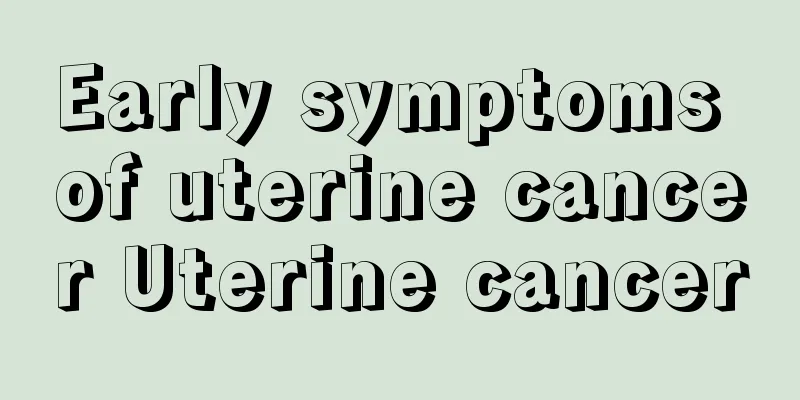Early symptoms of uterine cancer Uterine cancer

|
Early symptoms of uterine cancer usually include unexplained vaginal bleeding, abnormal menstrual cycles, and lower abdominal pain. These symptoms may be early warning signals from the body. It is recommended to seek medical attention as soon as possible to make a clear diagnosis and take intervention measures. Early screening and treatment can significantly improve the cure rate. 1. Unexplained vaginal bleeding The most common early sign of uterine cancer is irregular vaginal bleeding, especially in postmenopausal women. If you notice a significant increase in menstrual flow, prolonged menstrual period, or abnormal bleeding between periods, these are symptoms that need to be taken seriously. For women of childbearing age, bleeding after sexual intercourse may also be a warning sign. This bleeding may be related to early cancer cells invading endometrial tissue or blood vessels, so a gynecological examination should be performed as soon as possible, such as vaginal B-ultrasound or hysteroscopy. 2. Abnormal menstrual cycle Menstrual abnormalities are not only manifested in terms of flow, but also in cycle disorders. For women of childbearing age, if menstruation is frequently advanced or delayed for a period of time, and is accompanied by blood clots or dysmenorrhea, a variety of potential gynecological disease risks should be considered, including uterine cancer. Doctors will recommend taking endometrial tissue for biopsy, or performing uterine ultrasound to check for abnormal changes. 3. Lower abdominal pain and discomfort Patients with early uterine cancer often feel a dull pain or heaviness in the lower abdomen. Some patients may also feel back pain or leg weakness. These symptoms are often not typical and are therefore easily ignored. If the pain persists or gradually worsens, it is more necessary to be alert. It is recommended to cooperate with the doctor for a pelvic examination, magnetic resonance imaging, and other more in-depth diagnosis. 4. Abnormal leucorrhea and foul-smelling discharge Some patients may experience leucorrhea with blood or odor, which is another relatively common manifestation of early uterine cancer. When cancer cells affect the endometrium or other tissues, infection and tissue necrosis can lead to abnormal increase in secretions. Paying attention to these signs can also help detect potential problems as early as possible. After early uterine cancer is discovered, the following treatments can be used according to symptoms and condition: ① surgical resection, generally including hysterectomy; ② radiotherapy, used to kill remaining cancer cells; ③ hormone therapy, used as an option for conservative treatment of early patients. Maintaining a healthy diet and regularly screening the cervix and uterus are the keys to preventing uterine cancer. If any of the above symptoms occur, you should seek medical attention immediately to avoid delayed diagnosis and control the disease in its early stages. Regular physical examinations and health management are important means for women to protect their reproductive health. |
<<: Causes and symptoms of early tongue cancer
>>: Can uterine malformation lead to uterine cancer?
Recommend
Is esophageal cancer contagious?
Is esophageal cancer contagious? Is esophageal ca...
What treatment do patients with colon cancer need
At present, the treatment of colon cancer is main...
Melanin cultivation therapy
Melanin is something that most women want to elim...
Does ceramic perm hurt your hair? What are the advantages and disadvantages?
Ceramic perm is a popular perm technique in major...
What should I pay attention to after doing moxibustion
People need to pay a lot of attention after doing...
The dangers of excessive selenium
The balance of the human body is the result of th...
How to Remove Hair Dye Stains
In order to make their hair look better, many peo...
Understanding the HPV virus that causes cervical cancer
Cervical cancer is a major health hazard for wome...
Shaobing and dough making skills
Shaobing is a delicious pasta-based food that is ...
Can vitiligo be cured
Vitiligo can occur in any part of the body, and a...
What to eat when hair falls out? These are the first choices
As pressure from all aspects continues to increas...
How to grow a beard
Although most male friends shave every day, becau...
What is the function of braces? Correct use will give you a complete image
Braces are worn on the teeth like iron rings to c...
Barley boiled with mulberry leaves
Most people have a certain understanding of the e...
How long can you live with advanced lung cancer? Three decisive factors
The incidence of lung cancer is on the rise, and ...









